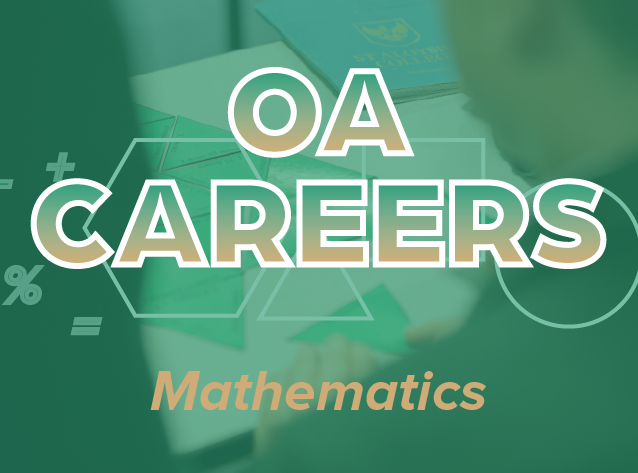Alumni News
OA Careers in Maths: James Forester (Class of '13)
- Throwback - 1996 Zimbabwe Rugby Tour
- Gold Medal OAs Make History At Commonwealth Youth Games
- OA Performs With NYCOS Chamber Choir
- All About The Climb: OA British Climbing Champion
- OA Careers In Maths: Iain McComish, Class Of '14
- OA Careers In Maths: Imogen West (Class Of '16)
- OA Careers In Maths: James Forester (Class Of '13)
- OA Captain Commemorates Remembrance Day
- OA Awarded Honorary Fellowship From Royal College
- OA Wins BAFTA Scotland Award For Best Feature Film
- Throwback - '94/'95 Rugby Cup Winners
- OAs Join Scotland U20 Six Nations Squad
- OA Charlie McCallum Talks RMPS And Studying Law
- A Trip Down Memory Lane For David And Sanjeev
- Glasgow Screenwriter Swaps Red Carpet For Crime Fighting
- OA Hall Of Fame Prof Bartholomew J McGettrick
- A Helping Hand: Vincent MacEachen (1997)
- Don’t Go Breaking My Heart: Prof John Fraser (1987)
- Oskar Wilkie - Manchester Marathon Achievement

At the end of S5 and the start of S6 at school, I was still undecided in what I wanted to study at university. I had three different choices in mind - economics, physics, and maths. In the end, I chose to study maths. Maths is a subject that is so diverse and has so many applications in so many different fields, so I was confident that I would be able to find my passion in maths.
In my final year at school I studied Advanced Highers in maths, physics and chemistry and also took the AS level in Religious Studies (Philosophy and Ethics). Since I had applied to Cambridge and Imperial College London, the STEP exam was part of my offer for both universities, so I took the STEP and STEP II exams a month after my Advanced Highers, in June 2013.
Although I had been keen to go abroad to fulfil a dream of mine to learn another language fluently, in the autumn after finishing school. I opted not to take a gap year and I went to Imperial to study the MSci "Mathematics with a Year in Europe". I would spend my third year studying in Spanish at the Autònoma University in Madrid.
At university it became appearnt to me that analysis was not my thing - I was definitely an applied guy. I did, however, find some aspects of pure maths very interesting - in particular alegebra and things like group and ring theorey. In third and fourth year I specialised in physics and applied-type things like Special Relativity and Electromagnetism, Quantum Mechanics, Mathematical Biology, as well as Game Theory, Mathematical Finance and the Mathematics of Business and Economics. After a year our teaching English in Germany, for academic year 18/19 I was at Edinburgh studying for the MSc in Economics.
My advice for anyone setting out studying maths is always to say on top of problem sheets, and all of the new concepts you meet in lectures or tutorials. A firm understanding of the basics really helps you later, when you build on older material. The sooner you really understand a concept (not just superficailly), the better. This helps both in terms of solving problems relating to that concept, as well as building on it in later material. The skills which I have most developed during my maths degree have to be problem solving and logical thinking.
I seem to remember a god quote used to hang on the wall in (I think) Dr Kilgour's room which read "Maths is not a spectator sport". This is an excellent mindset to have - you may go to a lecture (the spectating bit) and thing you've understood the material, but when you begin to tackle a related problem, at first you may not have a clue and you'll have to work really hard to solve it. Only then, once you've done a variety of different problems on the material, you will get a grasp of what is really going on, and only then will you develop that deeper understanding that is required for success in maths.
- OA Charlie McCallum talks RMPS and Studying Law
- OAs Join Scotland U20 Six Nations Squad
- Throwback - '94/'95 Rugby Cup Winners
- OA Wins BAFTA Scotland Award for Best Feature Film
- OA Awarded Honorary Fellowship from Royal College
- OA Captain Commemorates Remembrance Day
- OA Careers in Maths: James Forester (Class of '13)
- OA Careers in Maths: Imogen West (Class of '16)
- OA Careers in Maths: Iain McComish, Class of '14
- All About The Climb: OA British Climbing Champion
- OA Performs with NYCOS Chamber Choir
- Gold Medal OAs Make History at Commonwealth Youth Games
- Throwback - 1996 Zimbabwe Rugby Tour
- A Trip Down Memory Lane for David and Sanjeev
- Glasgow Screenwriter Swaps Red Carpet for Crime Fighting
- OA Hall of Fame Prof Bartholomew J McGettrick
- A Helping Hand: Vincent MacEachen (1997)
- Don’t Go Breaking My Heart: Prof John Fraser (1987)
- Oskar Wilkie - Manchester Marathon Achievement

